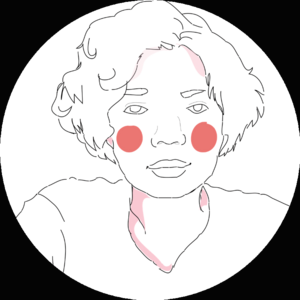The doctor took off his gold rimmed glasses and set them on the table. Esther looked at them. The lenses were round and thick. Through them she saw the word 'Depression' written on the notepad enlarge and swell into something illegible.
"I suggest you take a break,"he said, "from all that goes on--here,"he pointed to the side of his bald head. "Perhaps a stay in the countryside would do you well. Fresh air, you see Ms Davis, is very important and I think you don't have enough of it."
She nodded in silence.
A week later, Esther found herself in her small city apartment, packing a suitcase. She tossed in a few blouses, shirts and stockings, a worn sweater and a diary, then stood akimbo, glancing around. Every tiny space was occupied by books. Some were so old that their pages fell off when she opened them, and dozens of silverfish scrambled back into the binding. A typewriter sat snug on the table. Beside it, a small circular mirror showed her wide set, elfin eyes.
She swatted away the clothes that swamped the bed and lied down on the blanket. It smelled of moth balls and detergent and dust. Outside, the sign boards flickered on. A bar of pink neon light streamed in through the window, and when she held up her left hand, the light touched the tips of her fingers. One of them, the pinky, was slightly crooked. She had trouble getting it straight ever since the argument at the dinner party. She lowered her hand.
Peter had broken her in so many little ways.
Two days later, Esther was on the train moving north, towards the icy peaks, where the sun did not shine for days and where her grandmother Bethany lived with her four dogs. Warm countrysides where the folks were always jolly, and cows mooed and chewed grass all day long, was not for her. She put up her luggage on the rack and sat down comfortably, as much as it was possible with the scratchy leather seats and the harsh, biting cold that sank into her very bones. She tucked her chin in the folds of her scarf . With a lurch, the train started rolling.
Esther kept her gaze fixed on the tattered copy of a novel, trying not to pay attention to the whinging of a child on the seat opposite to her. The little girl was trying to coax her mother to buy her the small cakes the lady in the aisles was selling in a cart. The mother in turn looked tired and would not relent. For a while, Esther only listened, keeping her gaze on the words on the page which would not sink in her mind. Eventually though, Esther could not resist. She bought the cake from the lady and offered it to the little girl. The mother muttered something about cavities and did not talk to her for the rest of the journey.
Esther pressed her palm to the window glass, catching her reflection overlayed with the scenery outside. The little girl joined her as well. She smiled at Esther, but this time Esther looked away.
Slowly, the landscape outside changed. Blocks of concrete melted into a continuous white interrupted by tall poles and dotted with small cottages. It snowed. Tiny flakes slipped from the clouds, eddied and swirled down on earth, reflecting gentle flashes of light. Meanwhile the train snaked through the building mound of snow.
Dorothy, her baby, was conceived on a Christmas night. It was snowing heavily, and the world had frozen into a beautiful bubble of glass. Hoarfrost hung from the branches of trees like delicate lace. The streets were slippery, icy and reflected the glitter of the city laden in fairy lights and neon. There was a festive cheer in the air, and Peter and she were newlyweds. Poor, young and full of love. Damp in his threadbare coat, he came up to her while she sat by the window, typing a manuscript for the local magazine. He drew her away from the typewriter and into his arms, where it was warmer, where she could have stayed forever. She thumbed away the melting snowflake on his cheek. Then they kissed like young people do, with abandon. The papers spilled on the floor, shuffling, swirling, caught under the weight of her back when he pressed her down on the carpet and they made love.
One morning, the love bled from her. Dorothy died in her womb before she could see the world, and something between them dimmed, chipped and cracked. For days, she sat by the empty cradle, broken and sobbing, and Peter stayed away. Perhaps he was angry, perhaps he blamed her, or he was simply ashamed of her grief. She never forgave him for that cowardice, for keeping away when she needed him the most.
Esther shook her head. She put her palms to her face, rubbed her cheeks. They felt leathery, thirty two years of her life showing through faint creases.
When the train halted, Esther shook away the sleep heavy in her eyes. Darkness soon edged away and in poured a silky dawn. The breeze that stole inside the coach had a familiar smell. Of wet puddles and damp moss, of mushed leaves, of snow. Of childhood spent in some forgotten part of the world.
She dragged her luggage and herself into the cold air. After the constant rush of the city, the quiet, the lack of people on the platform struck her as eerie. With a slight tinge of hesitation, she glanced back at the train but it had began to move again. The big wheels rushed, spinning, crunching on the rails. She watched until the train was out of sight. The silence that followed after, was even worse. She hurried out of the station.
Even after all the years, there were no taxis. The buses seemed to have a fixed schedule and according to the smudged chart on a wall, the next one would take an hour to arrive. With the luggage on her lap, she took a seat on the icy metal bench and glanced about, looking lost as a child. All around her, she was surrounded by towering pine trees. The air was fresh, carrying the scent of the woods deep into her lungs. As the sun sank behind the treeline, flickering crimson and gold, she saw the shadows stretch and stretch. The sky periwinkled, then darkened completely. Stars burst and scattered pell mell.
The bus did not arrive. She took up the bag and started walking down the road.
In the cities, the sky was always murky with artificial orange lights and smoke and dead, exhausted dreams. When she would look out the window of the small apartment, she'd spot only a small patch of the blue through the criss cross of clotheslines and telephone wires. That night though, in that quaint little hill station, she saw thousands of stars clustered together, silver and twinkling. A constellation here, a lonely shimmer there. Eventually, her gaze returned to earth and carried the imprint of the stars to the dark soil. She rubbed her eyes, blinked, realizing it wasn't an illusion. Two golden spots--eyes?--gleamed down the road. Unmoving and still. She came to a halt, clutching her bag tightly.
"Just a cat,"she said, unsettled to hear her own voice in that stillness, and decided to go back to the bus stop instead of edging along the darkened cluster of pines.
An hour later, a low drone soothed the pointed silence. From down the road, a truck rolled towards the bus stop, its yellow headlights cutting sharply through the ink black space. Esther stood, almost dropping her bag, and hurried to the truck. But she need not have. The truck slowed and came to a halt a little distance away. Someone crept out of the door and heavy boots stamped on the ground. She couldn't yet see the face but the silhouette was big and bulky making her wonder how cramped it must be in that small driver's space.
"Esther?"
His tired, cough-afflicted voice registered vaguely in her head. Then a blurry face leapt out from her memory, suddenly growing alive and vivid, laughing as she lifted the small glittering fish she'd caught from the stream, angry when she'd been found loitering in the woods at dusk, pained when she'd left for the city with Peter.
" Johnny, it's you." Esther stepped towards her old friend. In the gloomy blue-black shadows, she made out a wrinkled face, small eyes and a full red beard flecked with bits of white. "Oh it's really you."
"Yes, I'm not dead." Johnny reached out for the luggage she'd been holding. His voice grew gentler. "Come now, Bethany is waiting. She'll wonder where I took her granddaughter."
Esther nodded and followed Johnny to the truck which smelled of oil, rust and leather. A cigarette, still burning, was set in a small metal box which served as an ashtray.
"Last I saw you, you had promised to quit,"she said, watching him tuck the cigarette between his lips. A spicy scent now mixed with the other odors.
Johnny gave a mirthless smile. "Last I saw you, you had promised to come visit. It's been a decade and you show up now. Was the city that dazzling?"
"So dazzling that you forget there is another place on earth."
"How is Peter?"
"I don't know."
"Got any kids?"
"No."
Esther leaned back into the tattered seat, her gaze resting ahead. Through the glass she saw the headlights fighting the thick darkness. Shadows of the pine trees reached for them from the edge of the forest.
"How is Grandma?,"she asked.
"Older. But she still insists on doing all the work by herself. You know how tough that can be. Wifey goes now and then to help out."
"Wifey,"Esther said, her lips forming a small smile. "She mellowed you."
Johnny blew a plume of smoke, then threw the cigarette outside.
"Good kind of love does that to you. You'll meet Lova now and then. Don't go about telling my secrets to her, girl."
Esther felt her heart clench at the endearing 'girl'.
"I'm happy for you, Johnny."
He gave her an imperceptible smile and drove onward to the house on the edge of the forest where Esther had spent twenty years of her life. And where she now intended to end it.











Comments (0)
See all